Ward A.W. The Cambridge History of British Foreign Policy. 1783-1919. Volume 3
Подождите немного. Документ загружается.

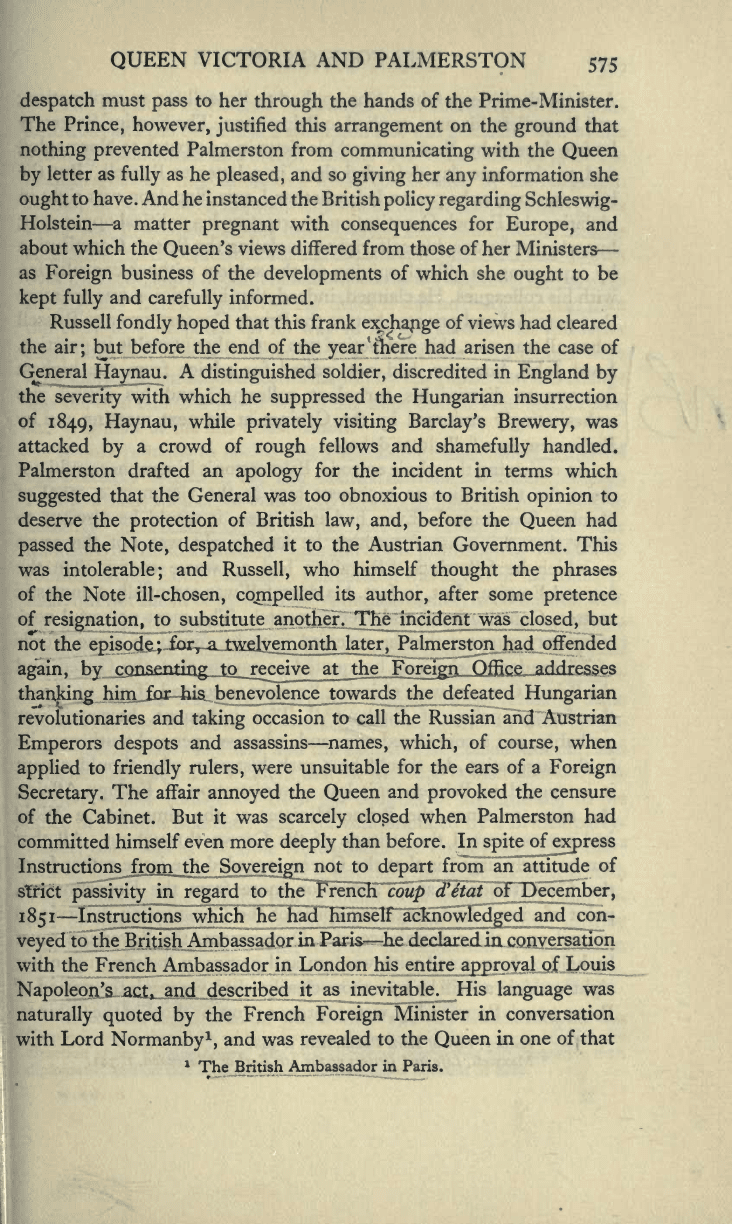
QUEEN
VICTORIA AND
PALMERSTON
575
despatch
must
pass
to
her
through
the hands of
the
Prime-Minister.
The
Prince,
however,
justified
this
arrangement
on
the
ground
that
nothing prevented
Palmerston from
communicating
with the
Queen
by
letter
as
fully
as
he
pleased,
and
so
giving
her
any
information she
ought
to have.
And he
instanced the British
policy
regarding Schleswig-
Holstein
—
a
matter
pregnant
with
consequences
for
Europe,
and
about which the
Queen's
views differed
from
those
of
her
Ministers
—
as
Foreign
business
of
the
developments
of
which she
ought
to
be
kept
fully
and
carefully
informed.
Russell
fondly hoped
that this
frank
exchange
of
views had
cleared
the
air;
but
before
the end
of
the
year'
there had
arisen
the case
of
General
Haynau.
A
distinguished
soldier,
discredited
in
England by
the
severity
with
which he
suppressed
the
Hungarian
insurrection
of
1849, Haynau,
while
privately
visiting
Barclay's
Brewery,
was
attacked
by
a
crowd
of
rough
fellows
and
shamefully
handled.
Palmerston drafted
an
apology
for
the incident
in
terms which
suggested
that
the
General
was too
obnoxious
to British
opinion
to
deserve
the
protection
of
British
law,
and,
before
the
Queen
had
passed
the
Note,
despatched
it
to
the Austrian Government.
This
was
intolerable;
and
Russell,
who
himself
thought
the
phrases
of
the
Note
ill-chosen,
compelled
its
author,
after
some
pretence
of
resignation,
to substitute
another. The incident was
closed,
but
not
the
episode;
for,
a
twelvemonth
later,
Palmerston had offended
again, by ronRpntin,g
t
n
_rec
eive
at
the
Foreign
Office addresses
thanking
him
fox
his
benevolence towards
the
defeated
Hungarian
revolutionaries and
taking
occasion to
call
the
Russian and Austrian
Emperors despots
and
assassins
—
names, which,
of
course,
when
applied
to
friendly
rulers,
were
unsuitable
for
the
ears of a
Foreign
Secretary.
The
affair
annoyed
the
Queen
and
provoked
the censure
of
the Cabinet. But it was
scarcely
closed
when
Palmerston
had
committed himself even
more
deeply
than before.
In
spiteofexpress
Instructions
from,
the
Sovereign
not
to
depart
from an
attitude
of
strict
passivity
in
regard
to the
French
coup~ffiiai
yJlDecember,
185
1
—
Instructions which
he
had
himself
acknowledged
and con-
veyed
to the British
Ambassador
in Paris
—
he
declared
in
conversation
with the
French Ambassador
in London his entire
approval
of
Louis
Napoleon's
acl»
and described
it
as i
nevitable.
H
is
language
was
naturally quoted
by
the
French
Foreign
Minister
in conversation
with
Lord
Normanby
1
,
and was
revealed to
the
Queen
in
one of that
1
The
British
Ambassador
in
Paris.
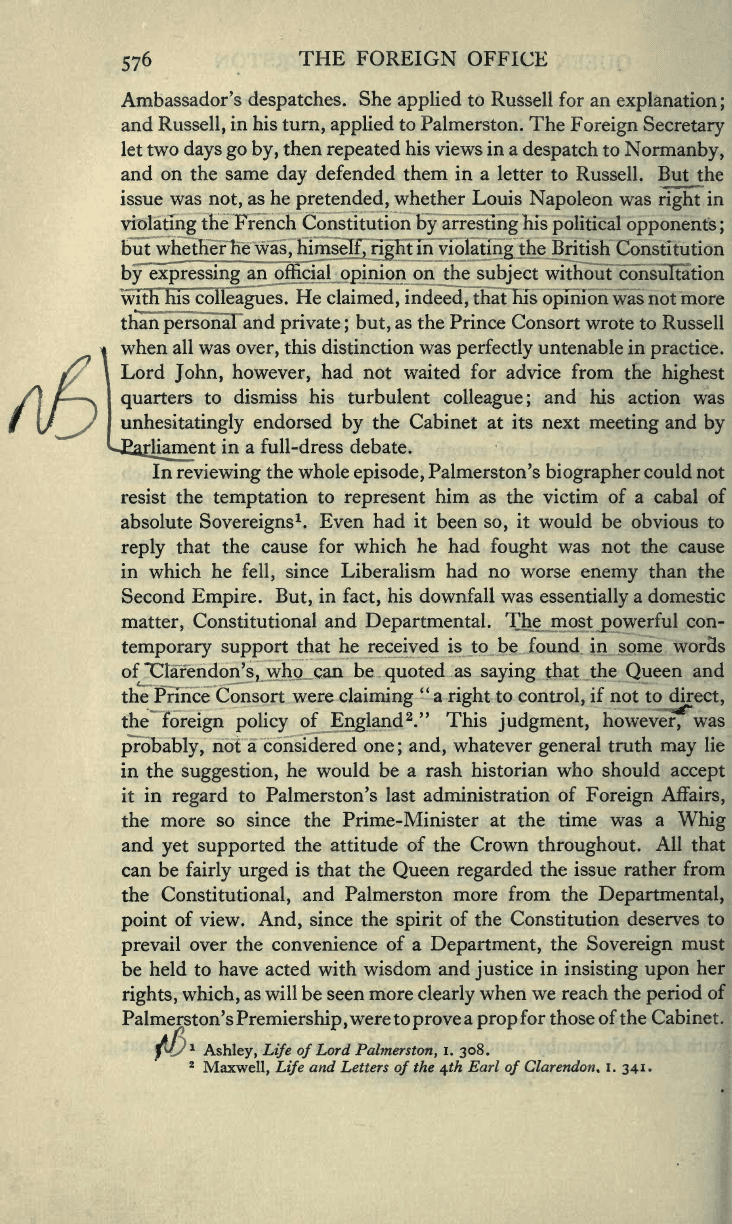
576
THE
FOREIGN
OFFICE
Ambassador's
despatches.
She
applied
to
Russell for
an
explanation
;
and
Russell,
in his
turn,
applied
to Palmerston.
The
Foreign Secretary
let
two
days go by,
then
repeated
his views in a
despatch
to
Normanby,
and
on
the
same
day
defended
them
in a
letter
to
Russell.
But the
issue was
not,
as he
pretended,
whether
Louis
Napoleon
was
right
in
violating
the
French
Constitution
by
arresting
his
political
opponents
;
but
whether
he
was,
himself,
right
in
violating
the British
Constitution
by
expressing
an official
opinion
on
the
subject
without consultation
with
his
colleagues.
He
claimed,
indeed,
that
his
opinion
was not more
than
personal
and
private
;
but,
as
the Prince
Consort
wrote to
Russell
when
all
was
over,
this distinction was
perfectly
untenable
in
practice.
Lord
John,
however,
had
not
waited
for
advice
from
the
highest
quarters
to
dismiss his
turbulent
colleague;
and
his action
was
unhesitatingly
endorsed
by
the
Cabinet at
its
next
meeting
and
by
^Earliament
in a full-dress debate.
In
reviewing
the
whole
episode,
Palmerston's
biographer
could
not
resist
the
temptation
to
represent
him as
the
victim
of a cabal of
absolute
Sovereigns
1
. Even
had
it been
so,
it would be
obvious to
reply
that the
cause
for
which
he had
fought
was
not
the cause
in which
he
fell,
since Liberalism
had no
worse
enemy
than the
Second
Empire.
But,
in
fact,
his downfall was
essentially
a
domestic
matter,
Constitutional
and
Departmental.
The
most
powerful
con-
temporary
support
that
he
received
is
to
be found in some words
of
"Clarendon's,
who can
be
quoted
as
saying
that the
Queen
and
the
Prince
Consort
were
claiming
-
a
right
to
control,
if
not
to
direct,
the
foreign
policy
of
England
2
."
This
judgment,
however,
was
probably,
not
a
considered
one;
and,
whatever
general
truth
may
lie
in
the
suggestion,
he would
be a rash
historian
who should
accept
it
in
regard
to Palmerston's
last administration
of
Foreign
Affairs,
the more
so
since
the
Prime-Minister
at
the
time
was
a
Whig
and
yet
supported
the
attitude
of
the
Crown
throughout.
All
that
can
be
fairly
urged
is
that
the
Queen
regarded
the
issue rather
from
the
Constitutional,
and
Palmerston
more from
the
Departmental,
point
of view.
And,
since
the
spirit
of
the Constitution
deserves
to
prevail
over the
convenience
of
a
Department,
the
Sovereign
must
be held to have
acted
with
wisdom
and
justice
in
insisting
upon
her
rights,
which,
as will be seen
more
clearly
when we reach the
period
of
Palmerston's
Premiership,
were to
prove
a
prop
for
those
of
the
Cabinet.
y*J
x
Ashley,
Life of
Lord
Palmerston,
I.
308.
2
Maxwell, Life
and
Letters
of
the
\th
Earl
of
Clarendon.
I.
341.
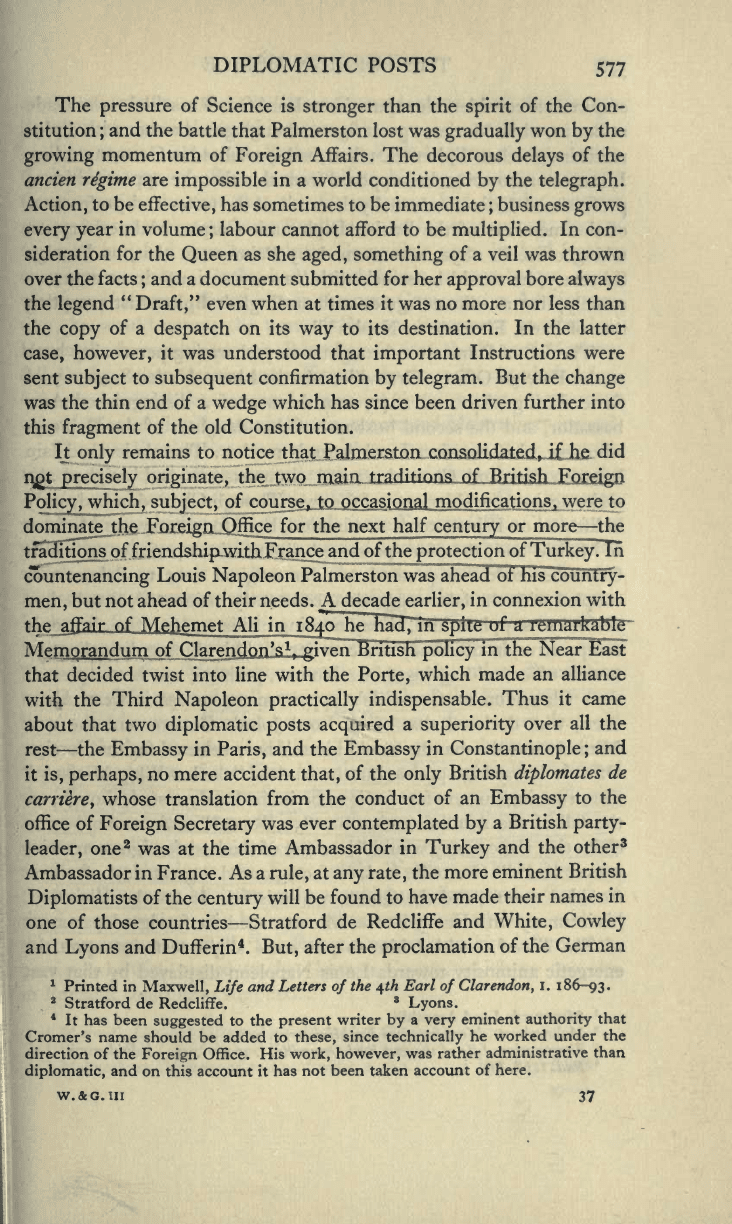
DIPLOMATIC
POSTS
577
The
pressure
of
Science
is
stronger
than
the
spirit
of
the
Con-
stitution
;
and the
battle
that
Palmerston lost
was
gradually
won
by
the
growing
momentum
of
Foreign
Affairs.
The decorous
delays
of
the
ancien
regime
are
impossible
in
a
world
conditioned
by
the
telegraph.
Action,
to be
effective,
has sometimes
to
be
immediate
;
business
grows
every year
in
volume
;
labour
cannot
afford to be
multiplied.
In con-
sideration
for
the
Queen
as
she
aged, something
of
a veil
was
thrown
over
the facts
;
and a
document submitted
for
her
approval
bore
always
the
legend
"
Draft,"
even when
at times it
was no more nor less than
the
copy
of
a
despatch
on
its
way
to its destination.
In
the latter
case,
however,
it
was
understood
that
important
Instructions
were
sent
subject
to
subsequent
confirmation
by telegram.
But the
change
was
the
thin
end of a
wedge
which has since been driven further into
this
fragment
of
the
old
Constitution.
It
only
remains
to
notice
that
Palmerston
consolidated^
if
he
did
n£t
precisely
originate,
the two
main
traditions- of
British F
oreign
Poli
cy,
w
hich,
subject,
ojjcou
rse
r
to
occasional
modifica
tions,
were to
dominate
the
Foreign
.Q
ffice for
the next
half
century
or
more
—
th
e
traditions
of
friendship
with
France
and of
the
protection
of
Turkey.
Io
countenancing
Louis
Napoleon
Palmerston
was ahead
of his
country-
men,
but
not
ahead of
their
needs.
A
decad
e
earlier,
in connexion
with
the,
jffair
of
Mehemet
AH in
1840
he
h
aa7'i
ii
Spile"
of a lenmi
kablr
Me
morandum
of
C
larend
on's
1
,
ffiven
British
policy
in the Near East
that
decided twist into line with the
Porte,
which made
an alliance
with
the
Third
Napoleon
practically
indispensable.
Thus
it
came
about that
two
diplomatic posts acquired
a
superiority
over
all
the
rest
—
the
Embassy
in
Paris,
and
the
Embassy
in
Constantinople
;
and
it
is,
perhaps,
no mere accident
that,
of
the
only
British
diplomates
de
carriere,
whose translation
from
the
conduct
of an
Embassy
to the
office
of
Foreign
Secretary
was ever
contemplated by
a
British
party-
leader,
one
2
was
at the time
Ambassador
in
Turkey
and the
other
3
Ambassador in France. As
a
rule,
at
any
rate,
the
more eminent
British
Diplomatists
of
the
century
will
be found to
have
made
their
names
in
one
of
those
countries
—
Stratford
de
Redcliffe and
White,
Cowley
and
Lyons
and
Dufferin
4
.
But,
after the
proclamation
of
the
German
1
Printed in
Maxwell,
Life
and
Letters
of
the
\th
Earl
of
Clarendon,
i.
186-93.
2
Stratford de
Redcliffe.
•
Lyons.
4
It has been
suggested
to the
present
writer
by
a
very
eminent
authority
that
Cromer's name
should
be added
to
these,
since
technically
he worked
under the
direction of
the
Foreign
Office.
His
work,
however,
was rather
administrative
than
diplomatic,
and on this
account
it
has
not been taken
account
of
here.
w.&g.iii
37
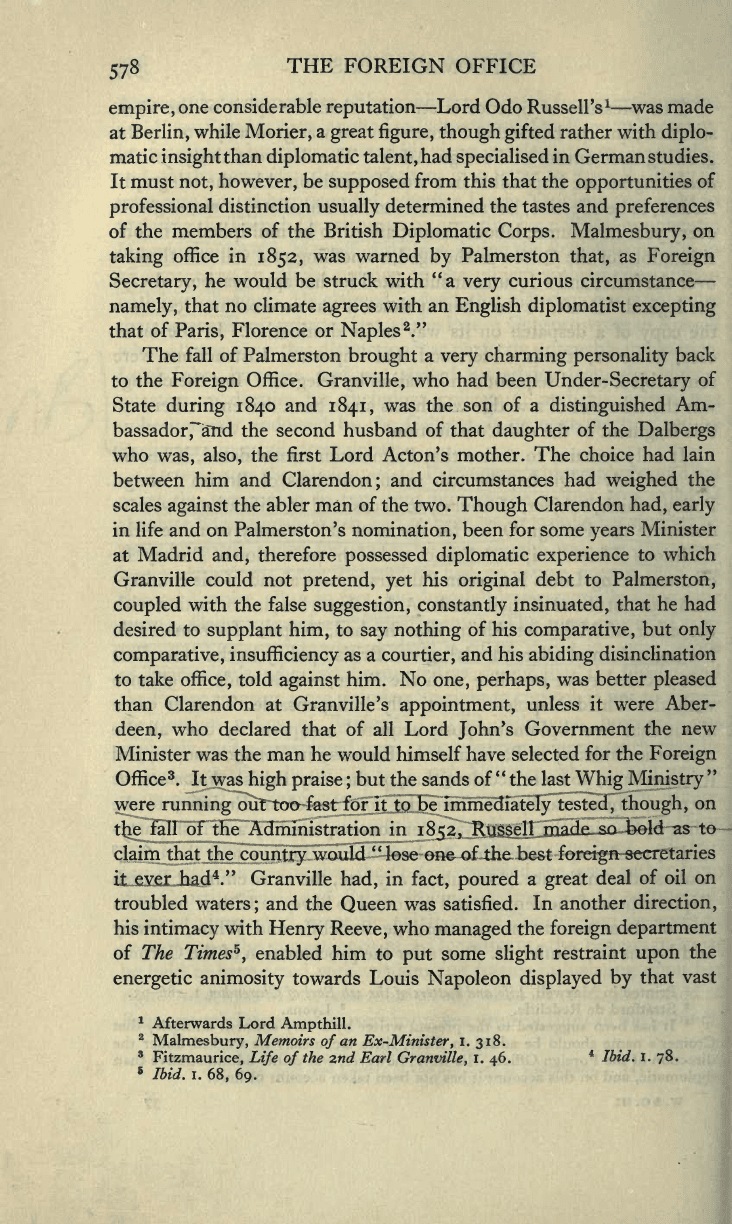
578
THE
FOREIGN
OFFICE
empire,
one
considerable
reputation
—
Lord
Odo
Russell's
1
—
was made
at
Berlin,
while
Morier,
a
great figure, though gifted
rather
with
diplo-
matic
insight
than
diplomatic
talent,
had
specialised
in
German
studies.
It
must
not,
however,
be
supposed
from this that the
opportunities
of
professional
distinction
usually
determined the tastes and
preferences
of the
members
of
the
British
Diplomatic
Corps.
Malmesbury,
on
taking
office in
1852,
was warned
by
Palmerston
that,
as
Foreign
Secretary,
he
would
be
struck with
"a
very
curious circumstance
—
namely,
that
no
climate
agrees
with
an
English
diplomatist
excepting
that
of
Paris,
Florence or
Naples
2
."
The
fall of
Palmerston
brought
a
very
charming personality
back
to
the
Foreign
Office.
Granville,
who had been
Under-Secretary
of
State
during 1840
and
1841,
was the son of
a
distinguished
Am-
bassador
pand
the second
husband of
that
daughter
of
the
Dalbergs
who
was, also,
the first
Lord
Acton's
mother.
The choice
had lain
between
him
and
Clarendon;
and circumstances
had
weighed
the
scales
against
the abler
man of
the two.
Though
Clarendon
had,
early
in life and on
Palmerston
's
nomination,
been for
some
years
Minister
at Madrid
and,
therefore
possessed
diplomatic experience
to
which
Granville could
not
pretend,
yet
his
original
debt to
Palmerston,
coupled
with
the false
suggestion,
constantly
insinuated,
that
he had
desired
to
supplant
him,
to
say
nothing
of his
comparative,
but
only
comparative,
insufficiency
as
a
courtier,
and his
abiding
disinclination
to take
office,
told
against
him.
No
one,
perhaps,
was better
pleased
than
Clarendon
at Granville's
appointment,
unless it were
Aber-
deen,
who declared
that
of all Lord
John's
Government
the
new
Minister
was
the
man
he would himself
have selected
for
the
Foreign
Office
3
.
It
was
high
praise
;
but
the
sands
of
"
the
last
Whig
Ministry
"
were
running
out too fast
for
it
to
be
immediately
tested,
though,
on
the
fall
of the
Administration
in
1852,
Russell
made
so
bold as to
claim
that
the
country
would
"lose one
of
the
best
foreign-
secretaries
it
ever had
4
."
Granville
had,
in
fact,
poured
a
great
deal
of oil
on
troubled
waters;
and
the
Queen
was satisfied.
In another
direction,
his
intimacy
with
Henry
Reeve,
who
managed
the
foreign
department
of The Times
5
,
enabled him
to
put
some
slight
restraint
upon
the
energetic animosity
towards Louis
Napoleon
displayed
by
that
vast
1
Afterwards Lord
Ampthill.
2
Malmesbury,
Memoirs
of
an
Ex-Minister,
1.
318.
3
Fitzmaurice,
Life of
the
2nd
Earl
Granville,
1.
46.
4
Ibid.
1.
78.
6
Ibid. 1.
68,
69.
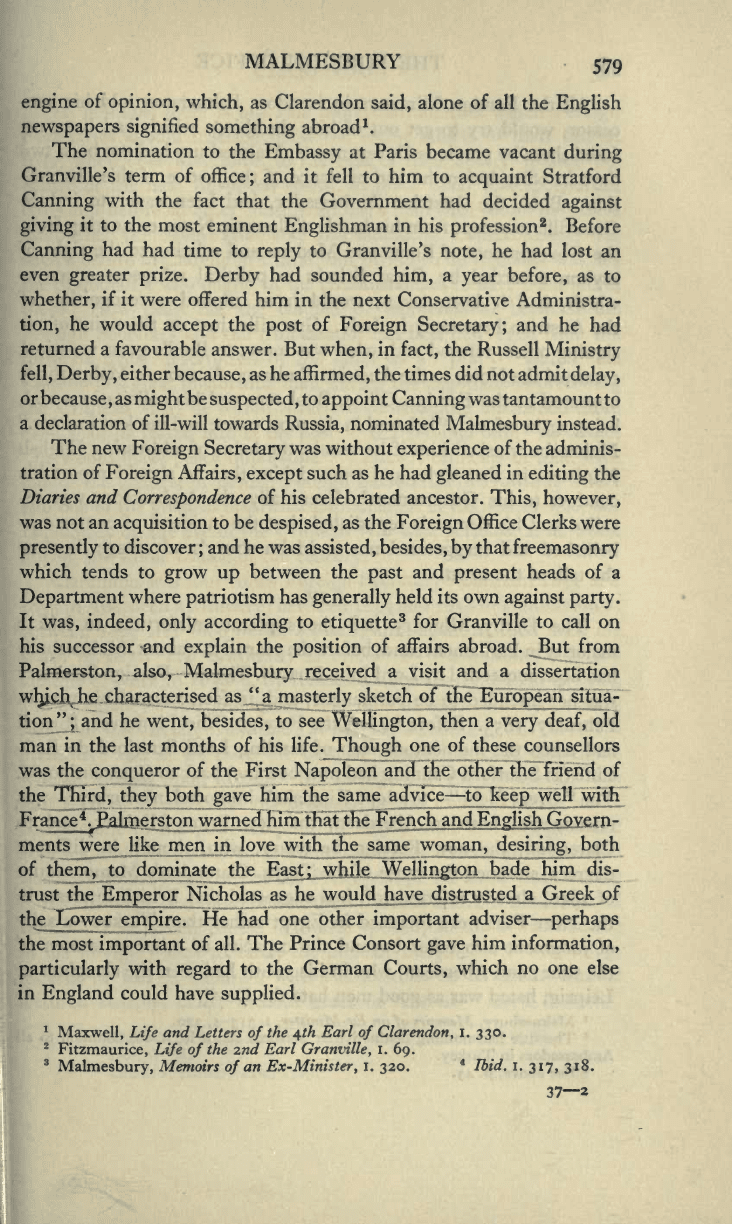
MALMESBURY
579
engine
of
opinion,
which,
as Clarendon
said,
alone
of
all
the
English
newspapers
signified
something
abroad
1
.
The
nomination to
the
Embassy
at Paris became
vacant
during
Granville's term of
office;
and
it
fell
to
him
to
acquaint
Stratford
Canning
with
the
fact that
the Government
had
decided
against
giving
it to
the
most eminent
Englishman
in his
profession
2
.
Before
Canning
had
had
time to
reply
to Granville's
note,
he had
lost an
even
greater prize.
Derby
had
sounded
him,
a
year
before,
as
to
whether,
if
it
were offered him in
the next Conservative
Administra-
tion,
he
would
accept
the
post
of
Foreign Secretary;
and
he
had
returned
a
favourable answer.
But
when,
in
fact,
the Russell
Ministry
fell,
Derby,
either
because,
as
he
affirmed,
the times did
not admit
delay,
or
because
,
as
might
be
suspected
,
to
appoint Canning
was
tantamount
to
a
declaration of ill-will
towards
Russia,
nominated
Malmesbury
instead.
The new
Foreign
Secretary
was
without
experience
of
the adminis-
tration
of
Foreign
Affairs,
except
such as he had
gleaned
in
editing
the
Diaries and
Correspondence
of his
celebrated ancestor.
This,
however,
was
not
an
acquisition
to be
despised,
as the
Foreign
Office Clerks
were
presently
to discover
;
and he was
assisted, besides,
by
that
freemasonry
which
tends to
grow
up
between
the
past
and
present
heads of
a
Department
where
patriotism
has
generally
held its
own
against
party.
It
was, indeed,
only
according
to
etiquette
3
for
Granville to call on
his
successor and
explain
the
position
of
affairs abroad.
But from
Palmerston,
also,
Malmesbury
received
a
visit
and a
dissertation
wljich,.he
characterised
as "a
masterly
sketch
of
the
European
situa-
tion";
and he
went, besides,
to
see
Wellington,
then
a
very
deaf,
old
man
in
the last months
of his life.
Though
one of
these counsellors
was the
conqueror
of the First
Napoleon
and
the other the friend of
the
Third,
they
both
gave
him
the
same
advice
—
to
keep
well
with
France
VEalmers
ton wame^Kim that the
French
and
English
Govern-
ments
were like men in love with the
same
woman,
desiring,
both
of
them,
to
dominate the
East;
while
Wellington
bade him dis-
trust the
Emperor
Nicholas as he
would
have
distrusted
a Greek of
the
Lower
empire.
He had
one
other
important
adviser
—
perhaps
the
most
important
of
all.
The
Prince
Consort
gave
him
information,
particularly
with
regard
to
the
German
Courts,
which
no
one else
in
England
could
have
supplied.
1
Maxwell,
Life
and Letters
of
the
4th
Earl
of
Clarendon,
1.
330.
2
Fitzmaurice,
Life
of
the 2nd
Earl
Granville,
I.
69.
3
Malmesbury,
Memoirs
of
an
Ex-Minister,
1.
320.
*
Ibid.
1.
317, 318.
37—2
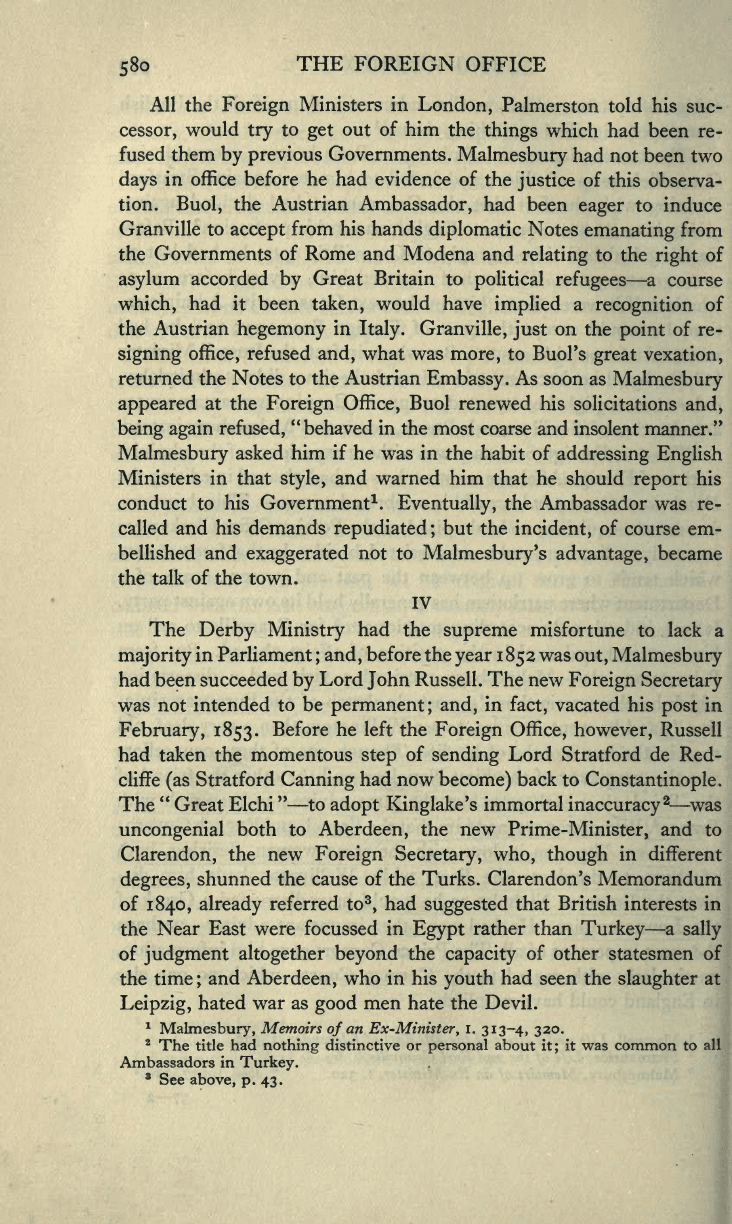
580
THE
FOREIGN
OFFICE
All the
Foreign
Ministers
in
London,
Palmerston told his
suc-
cessor,
would
try
to
get
out
of him
the
things
which had
been re-
fused them
by
previous
Governments.
Malmesbury
had
not been
two
days
in office before he had evidence of
the
justice
of
this observa-
tion.
Buol,
the Austrian
Ambassador,
had been
eager
to induce
Granville
to
accept
from his hands
diplomatic
Notes
emanating
from
the Governments
of Rome and
Modena and
relating
to the
right
of
asylum
accorded
by
Great Britain to
political
refugees
—
a course
which,
had
it
been
taken,
would have
implied
a
recognition
of
the Austrian
hegemony
in
Italy.
Granville,
just
on
the
point
of re-
signing
office,
refused
and,
what
was
more,
to Bud's
great
vexation,
returned the Notes to
the
Austrian
Embassy.
As soon as
Malmesbury
appeared
at
the
Foreign
Office,
Buol
renewed his
solicitations
and,
being again
refused,
"behaved in
the
most
coarse and
insolent manner."
Malmesbury
asked him
if
he was in
the
habit
of
addressing English
Ministers
in that
style,
and warned him
that
he
should
report
his
conduct to
his
Government
1
.
Eventually,
the Ambassador was re-
called and
his demands
repudiated
;
but the
incident,
of
course em-
bellished
and
exaggerated
not to
Malmesbury
's
advantage,
became
the talk
of
the
town.
IV
The
Derby Ministry
had
the
supreme
misfortune
to lack a
majority
in Parliament
;
and,
before
the
year 1852
was
out,
Malmesbury
had been succeeded
by
Lord
John
Russell. The
new
Foreign
Secretary
was
not
intended to
be
permanent;
and,
in
fact,
vacated his
post
in
February, 1853.
Before he left the
Foreign
Office, however,
Russell
had
taken
the momentous
step
of
sending
Lord
Stratford
de Red-
cliffe
(as
Stratford
Canning
had
now
become)
back
to
Constantinople.
The
"
Great
Elchi
"
—
to
adopt Kinglake's
immortal
inaccuracy
2
—
was
uncongenial
both to
Aberdeen,
the
new
Prime-Minister,
and
to
Clarendon,
the
new
Foreign
Secretary,
who,
though
in
different
degrees,
shunned the
cause of
the
Turks. Clarendon's
Memorandum
of
1840,
already
referred to
3
,
had
suggested
that
British
interests
in
the
Near
East
were focussed in
Egypt
rather than
Turkey
—
a
sally
of
judgment
altogether beyond
the
capacity
of
other statesmen
of
the time
;
and
Aberdeen,
who in his
youth
had
seen the
slaughter
at
Leipzig,
hated war
as
good
men hate the
Devil.
1
Malmesbury,
Memoirs
of
an
Ex-Minister,
1.
313-4,
320.
2
The title
had
nothing
distinctive
or
personal
about
it;
it
was common
to
all
Ambassadors
in
Turkey.
3
See
above,
p. 43.
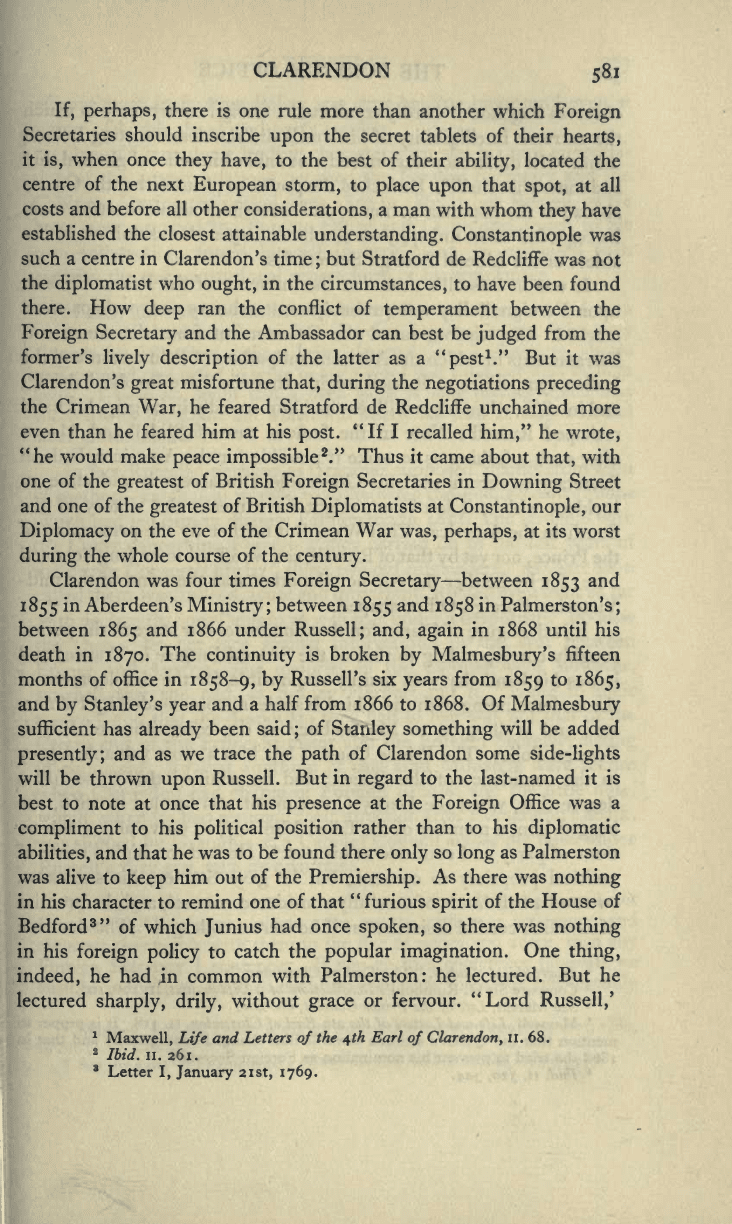
CLARENDON
581
If,
perhaps,
there is
one rule
more than
another which
Foreign
Secretaries should
inscribe
upon
the secret
tablets
of
their
hearts,
it
is,
when once
they
have,
to the
best
of
their
ability,
located the
centre of
the
next
European
storm,
to
place
upon
that
spot,
at
all
costs and
before all
other
considerations,
a man
with whom
they
have
established
the
closest attainable
understanding.
Constantinople
was
such
a
centre
in
Clarendon's
time;
but Stratford de
Redcliffe
was
not
the
diplomatist
who
ought,
in
the
circumstances,
to
have been found
there. How
deep
ran
the conflict
of
temperament
between
the
Foreign
Secretary
and
the
Ambassador
can
best be
judged
from
the
former's
lively description
of
the latter as a
"pest
1
."
But it
was
Clarendon's
great
misfortune
that,
during
the
negotiations
preceding
the Crimean
War,
he feared
Stratford
de
Redcliffe
unchained
more
even
than he feared
him
at
his
post.
"If I
recalled
him,"
he
wrote,
"he would
make
peace impossible
2
."
Thus
it came
about
that,
with
one
of
the
greatest
of
British
Foreign
Secretaries in
Downing
Street
and
one
of
the
greatest
of
British
Diplomatists
at
Constantinople,
our
Diplomacy
on
the
eve
of
the Crimean War
was,
perhaps,
at its worst
during
the
whole course
of
the
century.
Clarendon
was
four
times
Foreign Secretary
—
between
1853
and
1855
in
Aberdeen's
Ministry
;
between
1855
and
1858
in
Palmerston's;
between
1865
and 1866 under
Russell;
and,
again
in 1868 until his
death
in
1870.
The
continuity
is broken
by Malmesbury's
fifteen
months
of office in
1858-9,
by
Russell's
six
years
from
1859
to
1865,
and
by
Stanley's year
and
a
half from 1866
to
1868. Of
Malmesbury
sufficient
has
already
been
said;
of
Stanley
something
will
be added
presently;
and as we trace
the
path
of
Clarendon some
side-lights
will
be
thrown
upon
Russell.
But
in
regard
to
the
last-named it
is
best to note
at
once that
his
presence
at
the
Foreign
Office
was
a
compliment
to
his
political
position
rather than
to
his
diplomatic
abilities,
and
that
he
was
to
be found there
only
so
long
as Palmerston
was
alive
to
keep
him
out
of
the
Premiership.
As
there
was
nothing
in his
character to remind
one
of
that
"furious
spirit
of
the
House
of
Bedford
3
"
of which
Junius
had once
spoken,
so
there
was
nothing
in his
foreign
policy
to
catch
the
popular imagination.
One
thing,
indeed,
he
had in
common
with
Palmerston: he lectured.
But
he
lectured
sharply,
drily,
without
grace
or
fervour. "Lord
Russell,'
1
Maxwell,
Life
and Letters
of
the
4th
Earl
of
Clarendon,
11. 68.
2
Ibid. n.
261.
3
Letter
I,
January
21st, 1769.
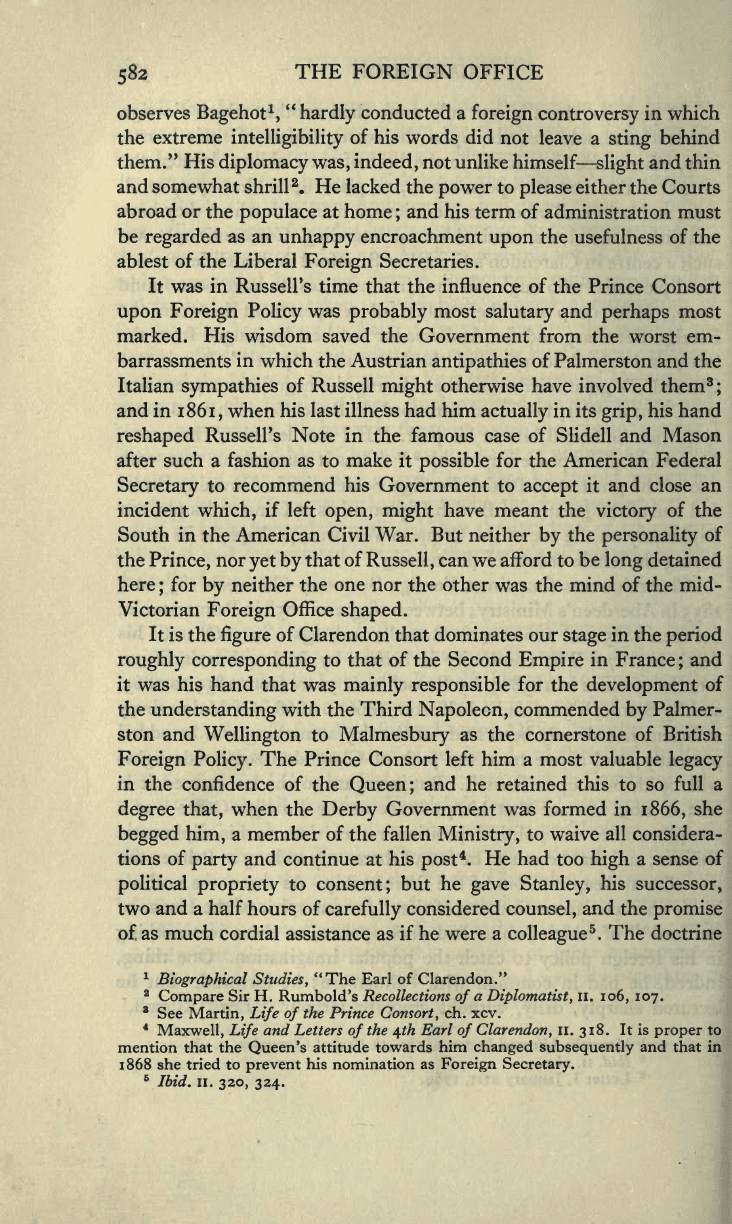
582
THE FOREIGN
OFFICE
observes
Bagehot
1
,
"hardly
conducted
a
foreign
controversy
in which
the
extreme
intelligibility
of his
words
did
not
leave
a
sting
behind
them."
His
diplomacy
was, indeed,
not
unlike
himself
—
slight
and
thin
and somewhat shrill
2
.
He lacked
the
power
to
please
either
the
Courts
abroad
or
the
populace
at
home
;
and his
term of
administration
must
be
regarded
as an
unhappy
encroachment
upon
the usefulness
of the
ablest
of the Liberal
Foreign
Secretaries.
It was
in Russell's
time that the influence of
the Prince Consort
upon Foreign
Policy
was
probably
most
salutary
and
perhaps
most
marked. His wisdom saved
the Government from
the worst
em-
barrassments
in
which
the
Austrian
antipathies
of
Palmerston
and
the
Italian
sympathies
of Russell
might
otherwise
have involved them
3
;
and in 1 86
1,
when
his
last
illness
had
him
actually
in
its
grip,
his
hand
reshaped
Russell's
Note
in
the
famous
case
of
Slidell
and Mason
after
such a fashion
as
to
make
it
possible
for
the
American Federal
Secretary
to
recommend
his
Government
to
accept
it
and close
an
incident
which,
if
left
open,
might
have
meant the
victory
of the
South
in
the
American Civil
War.
But neither
by
the
personality
of
the
Prince,
nor
yet
by
that
of
Russell,
can we afford
to
be
long
detained
here
;
for
by
neither
the
one
nor
the
other was
the
mind
of
the
mid-
Victorian
Foreign
Office
shaped.
It
is
the
figure
of
Clarendon that dominates
our
stage
in
the
period
roughly
corresponding
to that
of
the
Second
Empire
in
France
;
and
it
was his hand
that
was
mainly
responsible
for
the
development
of
the
understanding
with
the
Third
Napoleon,
commended
by
Palmer-
ston
and
Wellington
to
Malmesbury
as
the
cornerstone
of
British
Foreign Policy.
The
Prince Consort left
him
a
most
valuable
legacy
in
the confidence of
the
Queen;
and he
retained
this to
so
full a
degree
that,
when
the
Derby
Government
was formed in
1866,
she
begged
him,
a member of
the
fallen
Ministry,
to waive
all
considera-
tions
of
party
and
continue at
his
post
4
. He
had
too
high
a sense of
political
propriety
to
consent;
but
he
gave Stanley,
his
successor,
two
and
a half
hours of
carefully
considered
counsel,
and
the
promise
of
as
much cordial
assistance
as
if
he
were
a
colleague
5
.
The doctrine
1
Biographical
Studies,
"The
Earl of Clarendon."
2
Compare
Sir H.
Rumbold's
Recollections
of
a
Diplomatist,
II.
106,
107.
3
See
Martin,
Life
of
the Prince
Consort,
ch. xcv.
4
Maxwell, Life
and
Letters
of
the
\th
Earl
of
Clarendon,
11.
318.
It
is
proper
to
mention that the
Queen's
attitude
towards
him
changed subsequently
and
that
in
1868
she tried to
prevent
his nomination as
Foreign
Secretary.
5
Ibid. 11.
320, 324.
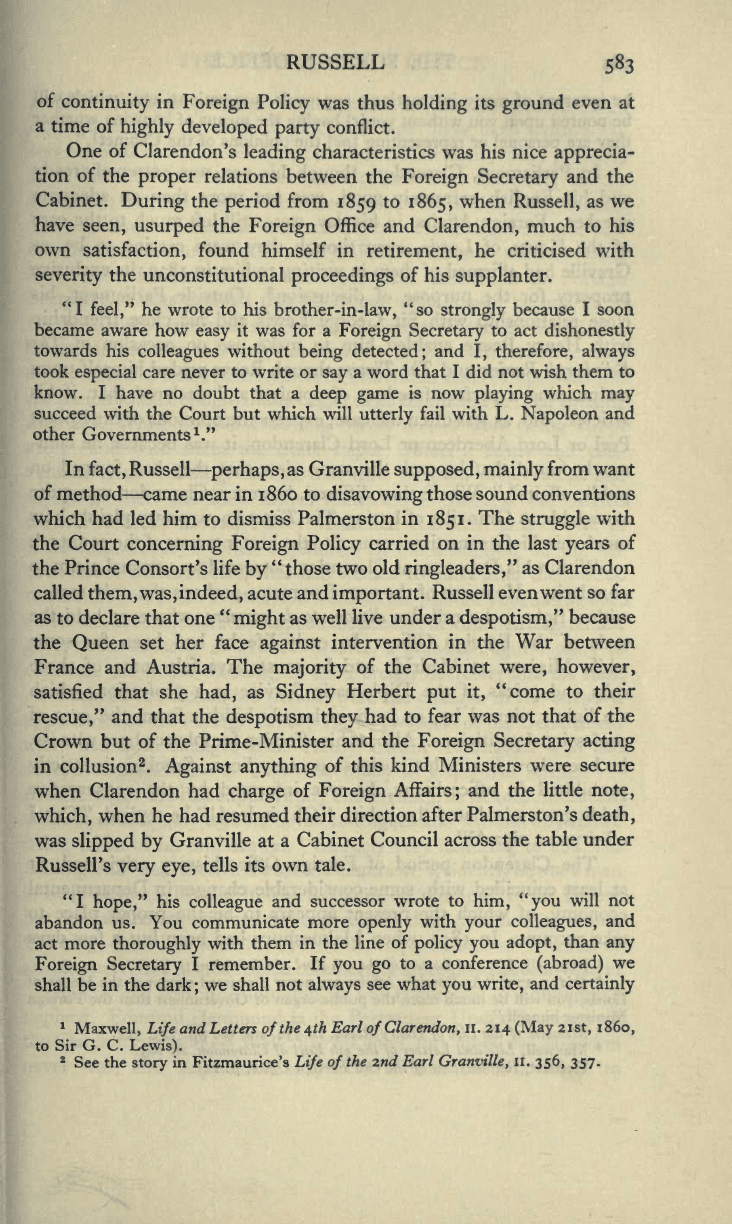
RUSSELL
583
of
continuity
in
Foreign
Policy
was
thus
holding
its
ground
even at
a
time
of
highly
developed
party
conflict.
One
of
Clarendon's
leading
characteristics
was his nice
apprecia-
tion
of
the
proper
relations
between the
Foreign
Secretary
and the
Cabinet.
During
the
period
from
1859
to
1865,
when
Russell,
as
we
have
seen,
usurped
the
Foreign
Office and
Clarendon,
much to
his
own
satisfaction,
found
himself in
retirement,
he
criticised
with
severity
the
unconstitutional
proceedings
of his
supplanter.
"I
feel,"
he wrote to
his
brother-in-law,
"so
strongly
because
I soon
became
aware
how
easy
it was for a
Foreign Secretary
to act
dishonestly
towards
his
colleagues
without
being
detected;
and
I,
therefore,
always
took
especial
care never
to
write
or
say
a
word that
I did not
wish
them
to
know.
I
have no doubt that a
deep game
is
now
playing
which
may
succeed
with
the Court
but
which will
utterly
fail with
L.
Napoleon
and
other
Governments
1
."
In
fact,
Russell
—
perhaps,
as Granville
supposed, mainly
from
want
of
method
—
came
near
in i860
to
disavowing
those
sound
conventions
which
had
led him
to
dismiss Palmerston
in
1851.
The
struggle
with
the
Court
concerning Foreign Policy
carried
on in
the last
years
of
the
Prince
Consort's life
by
"
those two
old
ringleaders,"
as
Clarendon
called
them,
was, indeed,
acute
and
important.
Russell even went
so
far
as
to declare that
one
"
might
as well
live under a
despotism,"
because
the
Queen
set
her face
against
intervention
in
the
War between
France
and
Austria.
The
majority
of
the
Cabinet
were,
however,
satisfied that
she
had,
as
Sidney
Herbert
put
it,
"come to
their
rescue,"
and
that the
despotism
they
had
to
fear was not that
of
the
Crown
but
of
the
Prime-Minister
and
the
Foreign
Secretary
acting
in collusion
2
.
Against
anything
of
this
kind
Ministers
were
secure
when
Clarendon
had
charge
of
Foreign
Affairs;
and
the
little
note,
which,
when he had resumed their
direction
after
Palmerston
's
death,
was
slipped by
Granville
at
a Cabinet
Council across the
table
under
Russell's
very
eye,
tells its
own tale.
"I
hope,"
his
colleague
and successor
wrote
to
him,
"you
will not
abandon us. You
communicate
more
openly
with
your
colleagues,
and
act more
thoroughly
with
them
in the line
of
policy
you
adopt,
than
any
Foreign Secretary
I remember.
If
you
go
to a conference
(abroad)
we
shall be
in the dark
;
we shall
not
always
see what
you
write,
and
certainly
1
Maxwell,
Life
and
Letters
of
the
4th
Earl
of
Clarendon,
11.
214 (May
21st, i860,
to
Sir G. C.
Lewis).
2
See
the
story
in
Fitzmaurice's
Life
of
the
2nd
Earl
Granville,
11.
356,
357.
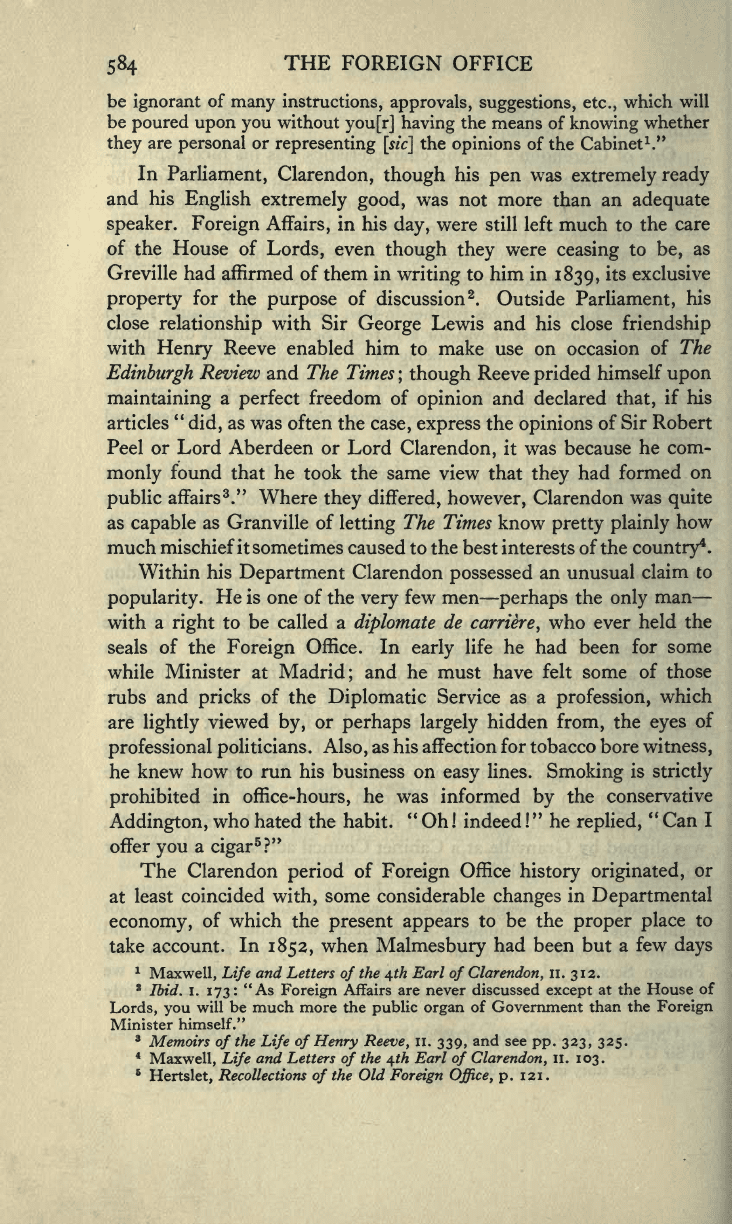
584
THE
FOREIGN
OFFICE
be
ignorant
of
many
instructions,
approvals,
suggestions,
etc.,
which
will
be
poured upon you
without
you[r] having
the
means
of
knowing
whether
they
are
personal
or
representing
[sic]
the
opinions
of
the Cabinet
1
."
In
Parliament,
Clarendon,
though
his
pen
was
extremely
ready
and his
English
extremely
good,
was
not
more
than
an
adequate
speaker.
Foreign
Affairs,
in his
day,
were still left much
to
the
care
of
the
House of
Lords,
even
though
they
were
ceasing
to
be,
as
Greville
had
affirmed
of
them
in
writing
to
him
in
1839,
lts
exclusive
property
for
the
purpose
of discussion
2
.
Outside
Parliament,
his
close
relationship
with
Sir
George
Lewis and
his
close
friendship
with
Henry
Reeve enabled him
to
make
use
on
occasion
of
The
Edinburgh
Review
and The
Times;
though
Reeve
prided
himself
upon
maintaining
a
perfect
freedom
of
opinion
and declared
that,
if his
articles
"
did,
as was
often
the
case,
express
the
opinions
of
Sir
Robert
Peel
or Lord
Aberdeen or Lord
Clarendon,
it
was because
he
com-
monly
found
that
he
took
the same view that
they
had
formed
on
public
affairs
3
." Where
they
differed, however,
Clarendon
was
quite
as
capable
as
Granville of
letting
The Times know
pretty
plainly
how
much mischief
it sometimes caused to
the best interests
of the
country
4
.
Within
his
Department
Clarendon
possessed
an unusual
claim to
popularity.
He
is
one
of
the
very
few men
—
perhaps
the
only
man
—
with
a
right
to
be
called a
diplomate
de
carriere,
who ever
held the
seals
of
the
Foreign
Office. In
early
life he had been
for
some
while Minister
at
Madrid;
and he
must
have
felt some
of
those
rubs and
pricks
of
the
Diplomatic
Service
as a
profession,
which
are
lightly
viewed
by,
or
perhaps
largely
hidden
from,
the
eyes
of
professional
politicians.
Also,
as his affection
for
tobacco
bore
witness,
he knew
how
to
run his business on
easy
lines.
Smoking
is
strictly
prohibited
in
office-hours,
he
was
informed
by
the
conservative
Addington,
who
hated the habit.
"
Oh
!
indeed
!
"
he
replied,
"
Can
I
offer
you
a
cigar
5
?"
The Clarendon
period
of
Foreign
Office
history
originated,
or
at
least
coincided
with,
some
considerable
changes
in
Departmental
economy,
of which
the
present
appears
to be the
proper
place
to
take
account.
In
1852,
when
Malmesbury
had
been
but
a few
days
1
Maxwell,
Life
and
Letters
of
the
\th
Earl
of
Clarendon,
11.
312.
*
Ibid. 1.
173:
"As
Foreign
Affairs
are never discussed
except
at the House
of
Lords,
you
will be
much more the
public
organ
of Government than the
Foreign
Minister
himself."
3
Memoirs
of
the
Life
of
Henry
Reeve,
n.
339,
and see
pp.
323, 325.
4
Maxwell, Life
and
Letters
of
the
4th
Earl
of Clarendon,
II.
103.
6
Hertslet,
Recollections
of
the
Old
Foreign
Office,
p.
121.
